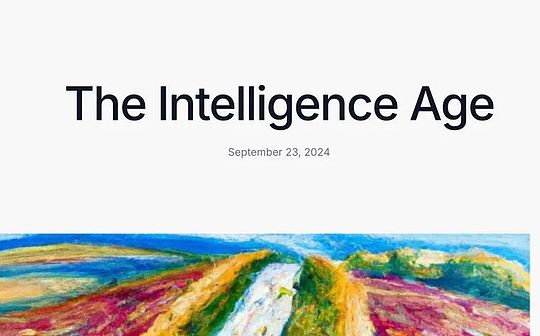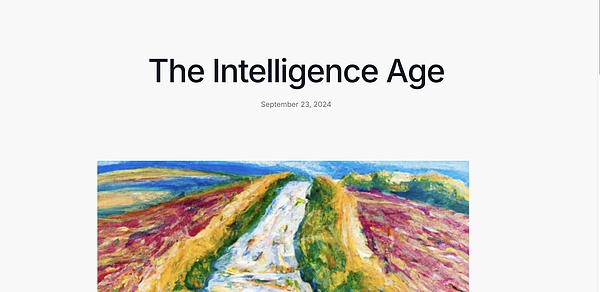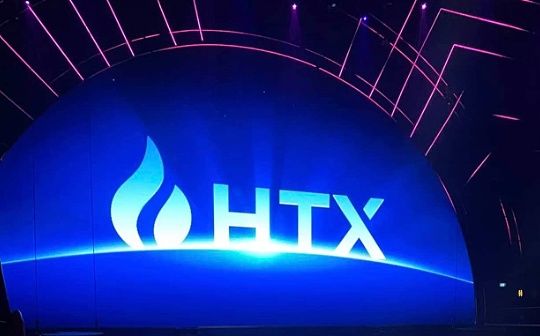
Source: Youxin Newin
On September 23, Sam Altman posted a blog post titled The Intelligence Age.Altman stressed that future technological advances will allow us to achieve what seems to us as almost “magic” to our ancestors, and accelerated innovation in AI will become the core force driving these changes.

Altman explains that humans have become increasingly capable in history not because our own genes have changed, but because social infrastructure has become smarter and more powerful.
AI will further enhance this, providing humanity with new tools to help us solve problems that were unsolvable in the past and promote the further prosperity of society.
He believes we will gradually transition to an era where everyone can have personalized AI assistants who not only assist our daily work, but also make disruptive changes – from health care to education toAll aspects of software development.
One of his core views—“Deep learning works.”Altman outlines the key factors in AI advancement in concise language – the breakthrough that deep learning, a technology that succeeds and continues to make predictable progress in scale will drive AI’s ability to solve complex problemsto promote the sustainable development of science, technology and economy.
In addition, Altman also portrays a promising “intelligent era”: the resolution of climate crisis, the establishment of space colonies, and the comprehensive exploration of physics will all become “normal things” that may be realized in the future.
He believes that human beings are about to enter a new era with almost unlimited intelligence and energy, which will make great ideas and creativity easier to implement and promote common global prosperity.
The following is the entire content of this article, enjoy~
Over the next few decades, we will be able to do something that seems to be magic to our grandparents.
This phenomenon is not new, but it will be accelerated further.Over time, human abilities have increased significantly; we have been able to accomplish something that our predecessors think is impossible.
The reason why we are more capable is not because of genetic changes, but because we benefit from the intelligence and ability of social infrastructure far exceeds that of us personally; in a sense, society itself is a form of advanced intelligence.
Our grandparents – and generations before them – created and accomplished great achievements.They contribute to the scaffolding of human progress, and we all benefit from it.
AI will provide people with tools to solve difficult problems and help us add new pillars to this bracket, helping us solve some problems that we cannot solve ourselves.The story of progress will continue and our children will be able to do something we cannot do.
All this won’t happen overnight, but we will soon be able to work with AI to help us accomplish more things that we can’t do on our own; ultimately, each of us can have an individual AI team composed of virtual experts in different fields, togetherCreate almost anything we can imagine.
Our children will have virtual mentors who can provide personalized guidance on any subject, in any language, and at any progress they need.We can envision similar ideas applied to better health care, creating software that anyone can imagine, and more.
With these new capabilities being realized, we can have a shared prosperity that seems unimaginable today; in the future, everyone can live better than anyone now.
While prosperity alone may not necessarily make people happy—there are many suffering people among the rich—it will significantly improve the lives of people around the world.
This is a narrow way of looking at human history: after thousands of years of scientific discoveries and technological advances, we have figured out how to melt sand, add some impurities, and then at extremely tiny scales with amazing precisionArranged on it into computer chips, running energy, and creating increasingly capable AI systems through these chips.
This is probably the most important fact about history so far.We may have super AI in a few thousand days (!); it may take longer, but I believe we will definitely achieve that goal.
How do we stand before this threshold for leap forward in prosperity?
To summarize in three words: Deep learning has worked.
Summarize in fifteen words: Deep learning works, and as the scale grows, it becomes predictably better, and we invest more and more resources.
That’s all; humans have discovered an algorithm that can really learn any data distribution (or, in fact, the underlying “rules” that produce any data distribution).Amazingly, the more computing power and data it performs better in helping people solve difficult problems.No matter how much time I spend thinking about this, I can never fully internalize its importance.
We still have many details to figure out, but being distracted by any particular challenge is wrong.Deep learning works and we will solve the remaining problems.We can say a lot about what might happen next, but the main point is that AI will get better as it scales, which will improve the lives of people around the world.
The AI model will soon serve as an autonomous personal assistant to perform specific tasks for us, such as coordinating our medical care.At some point in the future, AI systems will become so powerful that they will help us create better next-generation systems and drive scientific advancement in various fields.
Technology brings us from the Stone Age to the Agriculture and then to the Industrial Age.From here on, the road to the intelligent age is paved on computing power, energy and human will.
If we want to hand over AI to as many people as possible, we need to reduce the cost of computing and make it abundant (this requires a lot of energy and chips).If we don’t build enough infrastructure, AI will become a very limited resource that can trigger wars and mainly become a tool for the rich.
We need to act wisely but firmly.The dawn of the intelligent era is a major advance, accompanied by extremely complex and high-risk challenges.It won’t be a completely positive story, but it has a huge potential and it’s our responsibility to address the risks ahead of us for ourselves and for the future.
I believe the future will be so bright that no one can truly express it through writing; a decisive feature of the intelligent age will be great prosperity.
While this will happen gradually, amazing triumphs such as climate restoration, the establishment of space colonies, and the comprehensive discovery of physics will eventually become commonplace.
With almost unlimited intelligence and abundant energy – the ability to generate great ideas, and the ability to make those ideas come true – we can do a lot.
As we have seen in other technologies, there will be negative effects, so we need to start working now to minimize its harm while maximizing the benefits of AI.
For example, we expect this technology to have a significant impact on the labor market in the coming years (good and bad), but most jobs will change more slowly than most people expect, and I don’t worry we will have nothing to do(even if these jobs don’t look like “real jobs” today).
Humans have an innate desire to create and be useful to each other, and AI will enhance our abilities like never before.As a society, we will be in an expanded world again, and we can refocus on the positive sum game.
Many of the work we do today seemed to be meaningless waste of time hundreds of years ago, but no one looked back and longed to be a light-lighter.
If a light-lighter can see the world today, he will feel that the prosperity around him is unimaginable.And if we could fast forward to today a hundred years later, the prosperity around us would be equally incredible.








